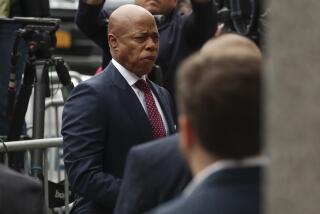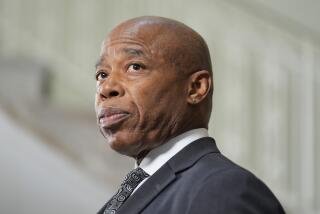N.Y. Gunman Complained He Was Being Blackmailed
- Share via
NEW YORK — He was a political novice who looked forward to his campaign for a Brooklyn City Council seat this fall. But when Othniel Askew was disqualified from running because of a technicality -- and later claimed the incumbent councilman had blackmailed him -- the candidate became an assassin, law enforcement officials said Thursday.
Askew, who shot Councilman James E. Davis at City Hall on Wednesday in front of hundreds of onlookers, was not well-known in Brooklyn’s 35th Council District. But in less than a month, he struck up a relationship with Davis and then accompanied him as a guest to City Hall, before killing him in a balcony above the council chambers.
Seconds after killing Davis, Askew was slain by plainclothes police Officer Richard Burt, who had been stationed below and fired upward into the crowded balcony.
Davis spokeswoman Amyre Loomis told reporters that Askew and her boss had appeared to have reconciled any differences they had over Askew’s aborted candidacy, and that Davis brought him to City Hall as a friendly gesture. She added that Davis “would have had no idea” that Askew represented a threat to him.
Although there is no official explanation for Askew’s motives, law enforcement officials have said that Askew, 31, had complained to them about Davis several hours before he carried out the shooting. The officials said Askew told them that Davis had sought to blackmail him, allegedly threatening to assert that Askew was gay if he ran against the councilman.
All of Askew’s claims remain under investigation by the New York Police Department.
Askew “said Davis was engaging in a campaign of harassment targeting Askew in connection with the upcoming primary election,” said Joseph Valiquette, an FBI spokesman. “During his conversation with our employee, Askew never expressed any intention to harm Councilman Davis, and he seemed to be rational.”
The gunman was able to smuggle his semiautomatic weapon into City Hall past metal detectors because he was Davis’ guest, and the two took advantage of a courtesy that allowed elected officials to skirt security lines. New York Mayor Michael R. Bloomberg said Thursday that this policy has now ended, and that all people entering the building would have to go through a security check. He added that henceforth only active duty law enforcement officials could bring weapons into the building.
Bloomberg also hailed Burt for his heroism in killing Askew. The mayor and New York Police Commissioner Raymond Kelly said Thursday that Burt, a nine-year veteran of the force, had been promoted to detective-investigator in recognition of his actions.
“Thankfully, we will never know what would have happened had Officer Burt not been there, been so quick on his feet and been so accurate with his gun,” the mayor said at a City Hall news conference, noting that Davis’ assailant fired seven bullets and was carrying seven more. “We don’t know what he would have done.”
Davis’ constituents Thursday erected a memorial of flowers and candles outside his Fort Greene office, and Bloomberg visited the site. Activists announced there would be a memorial service for the slain councilman in Brooklyn on Saturday.
The details of Askew’s aborted campaign and dealings with Davis began emerging Thursday, with City Hall aides, journalists and district activists calling Askew an intense but inexperienced candidate who was devastated by his inability to get on the ballot. John Ravitz, executive director of the city’s Board of Elections, confirmed that Askew had failed to file required signatures on petitions establishing his candidacy by a July 11 deadline, thus disqualifying him from the Democratic primary contest.
Askew blamed this on “human incompetency” among his own followers, not on Davis, according to a series of e-mails the would-be candidate sent to Erik Engquist, political columnist for the Brooklyn Courier-Light, a community newspaper.
“So five weeks of his own work and his own money were completely wasted, and I’m thinking this may have had something to do with his state of mind,” Engquist said in an interview with WNBC-TV. “He was clearly upset and unhappy.”
But the candidate also had differences with Davis. While Brooklyn Councilman Kendall Stewart suggested the men reached an agreement that Askew would not run, some district activists said Askew had unsuccessfully asked Davis for a job. Others said he gave a letter to Davis saying Askew would be the councilman’s successor if something happened to Davis; the councilman rejected this, observers said.
Although few residents in Askew’s Fort Greene neighborhood knew much about him, the candidate submitted a biography to the columnist, describing himself as “born to economically challenged parents in Brooklyn, New York, where his father at the time was a local beverage delivery man in Prospect Heights, as he remains today.”
The resume said Askew had been honorably discharged from the U.S. Air Force in 2001 and had worked in real estate development and construction.
More to Read
Sign up for Essential California
The most important California stories and recommendations in your inbox every morning.
You may occasionally receive promotional content from the Los Angeles Times.










